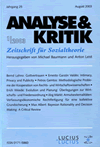Suchergebnisse
"Stephanie Malin"
Titel: When Is ’Yes to the Mill’ Environmental Justice? Interrogating Sites of Acceptance in Response to Energy Development
Autor: Stephanie Malin
Seite: 263-285
Abstract: Though grassroots organizations have mobilized against US environmental injustices since the 1980s, academic definitions of environmental justice (EJ) remain limited in important ways, including: a tendency to privilege cases where activists achieve a successful, ’tidy’ outcome; inattention to roles natural resource dependence and free market systems play in structuring environmental inequality; and a tendency to under-analyze alternative notions of EJ that result, utilized by activists who prioritize local autonomy and procedural justice in land-use decision making. Here, I argue that these alternative notions of EJ help mobilize divergent forms of EJ activism ’sites of resistance’ to industrial production systems and their risks, and ’sites of acceptance’ to those same practices. To illustrate, I explore extensive mixed method data in the context of energy development and sites of acceptance related to uranium production in the southwestern United States. I show how alternative notions of EJ are shaped by identification with uranium production, persistent poverty and economic insecurity, and faith that increased uranium production will fuel US nuclear power production and help combat global climate change.

Environmental Justice: Empirical Concerns and Normative Reasoning
2014 (36) Heft 2
Guest-Editor: Gordon Walker
Editorial
In Why Things Matter to People Andrew Sayer reminds us that we are evaluative beings in which normative questions strongly figure in our everyday lives “because while we are capable and can flourish we are also vulnerable and susceptible to various kinds of loss or harm“ (Sayer 2011, 1). The ’environment’, understood in broad terms, provides one arena or frame within which evaluative questions necessarily figure, because of its centrality to our individual and collective flourishing or s...